Breast (Mammary) Cancer in Dogs
Mammary tumors in dogs are very similar to breast cancer in women. Owners may find a lump in their dog's breast tissue. Dogs have five pairs of mammary glands. They are divided into two mammary chains down the sides of the body. Mammary tumors develop in the breast tissue.
This type of cancer is most common in unspayed female dogs. These dogs have fully developed mammary tissue because of the estrogen produced by the ovaries. Dogs that have been spayed have a reduced risk of dog breast cancer.
The incidence of cancerous tumors is related to whether a dog has been spayed. Dogs spayed prior to their first heat have only a 0.5% risk of developing mammary tumors. After the second heat, this risk dramatically increases to 26%.* About 50% of breast tumors in dogs are malignant. Since mammary tumors are easily felt, in many cases they are caught early and can be successfully treated with surgery.
*Reference: Malignant Mammary Tumors in Dogs. VCA Animal Hospitals. Debbie Stoewen and Christopher Pinard.
What Are The Types Of Breast Cancer In Dogs?
Mammary tumors in dogs are malignant or benign. The most common tumors are non-cancerous (benign) adenomas and cancerous (malignant) carcinomas. Having multiple mammary tumors at once is quite common. Most breast cancer is diagnosed in older dogs, with a higher probability after age 7. Mammary tumors in dogs primarily metastasize to nearby lymph nodes or the lungs.
Symptoms Of Mammary Cancer In Dogs
The first clinical sign of breast cancer in dogs is usually a lump or nodule near a nipple on their abdomen. In many cases, dogs will not show any other symptoms until the cancer has progressed. Subtle changes to appetite, mood and activity may signal that your dog does not feel well. Symptoms of breast cancer may include:
- Painful abdomen, usually in the area near back legs
- Swollen breasts
- Sores on the skin or nipple
- Nipple discharge (pus or blood)
- Exercise intolerance, low energy level and lethargy
- Poor appetite and gradual weight loss
Certain breeds have a higher risk of developing breast cancer. Those breeds include Chihuahuas, Poodles, Cocker Spaniels, Dachshunds, Yorkshire Terriers, Boxers and Doberman Pinchers.
Mammary Tumors in Dogs Treatment
Surgery to remove the mammary tumor and surrounding tissue is the recommended conventional veterinary treatment in most cases. The lymph nodes that the mammary glands drain into are generally removed as well.
If your dog is unspayed, most veterinarians will complete this procedure at the same time as tumor removal. Tumor removal is usually effective in treating canine breast cancer. Chemotherapy and radiation are usually only used in dogs that have metastasized or inoperable tumors. Radiation may be helpful for dogs with inflammatory mammary carcinoma (IMC), a highly malignant form of mammary tumors. IMC presents with severe inflammation of the mammary glands with symptoms resembling mastitis.
Holistic treatments for dog breast cancer can be combined with most conventional veterinary options. Adding supplements for mammary tumors in dogs, such as medicinal mushrooms, curcumin, CoQ10 and fish oil, can support your dog's immune system and overall well-being.
Feeding a low carbohydrate cancer diet rich in omega-3s and fresh nutrients can also help. At Ask Ariel, we will include FREE dog breast cancer diet tips on the packing slip that comes with your order.
How Long Can A Dog Live With Mammary Tumors?
The life expectancy of a dog with mammary tumors varies depending on the type of cancer and the treatments selected. The prognosis is excellent for a dog with a benign tumor.
Tumor removal surgery can be curative for about 50% of dogs with malignant tumors. For dogs in which cancer has spread to the lymph nodes, the average survival time is about a year. Unfortunately, dogs diagnosed with inflammatory mammary carcinoma (IMC) usually only have weeks to live.
Whether your dog has surgery or not, supportive care using holistic cancer supplements and a dog mammary cancer diet can improve the quality of life for your pet and, often, the quantity of time as well.
Do Cats Get Breast Cancer?
Yes, cats can get breast cancer, too. Mammary cancer is the third most common form of cancer in cats, behind lymphoma and skin cancer. Cat breast cancer is usually seen in middle-aged and older female cats (around 10 years and up).
Certain breeds, like Persians and Siamese, tend to have a higher risk of developing mammary tumors. Spaying female cats before their first heat cycle can reduce the risk of developing breast cancer by over 90%. Male cats can also get mammary tumors, but it is very rare.
The clinical signs of cat mammary cancer are very similar to those found in dogs. The first symptom is a mass that can be felt near the mammary glands. Many cats will overgroom the area and this can cause ulcerations and bleeding. Most mammary tumors in cats are malignant, almost 9 out of 10. If the tumors are found early, surgery can be done to remove the affected tissue. Since cat breast tumors are generally aggressive, chemotherapy is often included in the veterinary treatment protocol.
With feline mastectomies, cats can live for 3 or more years. The prognosis is more guarded if there are multiple tumors or if cancer has spread through the lymph nodes to other organs.
The Best Diet for Dogs With Mammary Tumors
Mammary cancer in dogs treatment includes not only surgery and supplements, but diet changes as well. Dogs with breast cancer can benefit from a low-carbohydrate, hypoallergenic diet, rich in Omega-3 fatty acids.
Research studies have shown that eicosapentaenoic acid (EPA) and docosahexaenoic acid (DHA), two types of omega-3 fatty acids, can help slow the development of tumors and metastases of certain cancers. Using a high-quality fish oil and adding a small portion of baked fish or sardines in water can provide a source of omega-3s in your dog's diet.
Diets high in carbohydrates may promote tumor growth and should be controlled. Dry food diets generally are high in carbohydrates so choosing another form of dog food such as raw frozen, canned or homemade can be beneficial.
Adding an array of fresh vegetables can provide important enzymes and nutrients to your dog's diet. Since the majority of your dog's immune system resides in the intestinal tract, maintaining a balanced microbiome is also essential. Probiotics along with fresh foods containing prebiotic fibers can support a healthy immune system.
Ask Ariel has extensive experience formulating diets for pets with cancer as our Pet Nutritionist Susan Davis offered holistic consultations for over 10 years at VCA hospitals and at a veterinary oncology clinic. While we no longer offer consultations, we do include FREE dog mammary cancer diet tips on the packing slip that comes with your order.
What Our Customers Are Saying
Cookie
"Cookie is my senior cocker spaniel/dachshund mix rescued a few years ago. Just over a year ago, she had a malignant mammary tumor removed and it was suggested that she have chemotherapy immediately thereafter so it wouldn't come back. Instead, I did some research for alternatives, found Ask Ariel, and then decided to try the OncoPet and Immune Harmony cancer package. It is obvious that Cookie's health only got better from that point on and I am grateful to Ask Ariel for their advice and fabulous products! Cookie also benefits from Phosphatidyl Serine for her Cushing's Disease, Amazing Omegas, and Power Probiotic.
Thanks also to the Ask Ariel team for superb customer service and fabulous bonus gifts. It is clear that you all care very much about your customers and their furbabies! Thanks again!!" - Gina, Florida
Recommended Supplements for Dogs with Mammary Cancer
Our supplements for dog mammary tumors can be used in conjunction with conventional veterinary treatments prescribed by your veterinarian or veterinary oncologist.
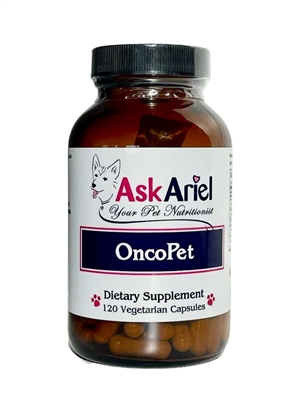 OncoPet Cancer Vitamin For Dogs is a proprietary blend of herbs and medicinal mushrooms that provide powerful immune support. The natural ingredients in OncoPet contain polyphenols, beta-glucans and antioxidants, like D-fraction and L-ergothioneine, that boost the immune system and help regulate your dog's inflammatory response. OncoPet is a comprehensive dog cancer vitamin that also includes herbs to help balance the gut microbiome and reduce nausea and cancer-related fatigue. Combines well with cancer treatments from your veterinarian or veterinary oncologist. Helps pets handle chemotherapy and radiation. Excellent value. One bottle lasts up to 8 months for small dogs. OncoPet Cancer Vitamin For Dogs is a proprietary blend of herbs and medicinal mushrooms that provide powerful immune support. The natural ingredients in OncoPet contain polyphenols, beta-glucans and antioxidants, like D-fraction and L-ergothioneine, that boost the immune system and help regulate your dog's inflammatory response. OncoPet is a comprehensive dog cancer vitamin that also includes herbs to help balance the gut microbiome and reduce nausea and cancer-related fatigue. Combines well with cancer treatments from your veterinarian or veterinary oncologist. Helps pets handle chemotherapy and radiation. Excellent value. One bottle lasts up to 8 months for small dogs.
.png) Happy Paws Organic Hemp Extract For Dogs is a professional veterinary strength CBD oil that can help reduce inflammation and support a healthy immune system. Controlling inflammation is a core part of cancer treatment and that is the main characteristic of this dog breast cancer oil. The ingredients in Happy Paws are being researched for their ability to reduce metastasis and cancer growth in certain types of cancer. Anecdotal reports include reduced pain, inflammation and discomfort. Each 1oz bottle contains 550mg of full-spectrum hemp extract in an unflavored all-natural coconut-oil base. It’s 100% organic and made in the USA. Happy Paws Organic Hemp Extract For Dogs is a professional veterinary strength CBD oil that can help reduce inflammation and support a healthy immune system. Controlling inflammation is a core part of cancer treatment and that is the main characteristic of this dog breast cancer oil. The ingredients in Happy Paws are being researched for their ability to reduce metastasis and cancer growth in certain types of cancer. Anecdotal reports include reduced pain, inflammation and discomfort. Each 1oz bottle contains 550mg of full-spectrum hemp extract in an unflavored all-natural coconut-oil base. It’s 100% organic and made in the USA.
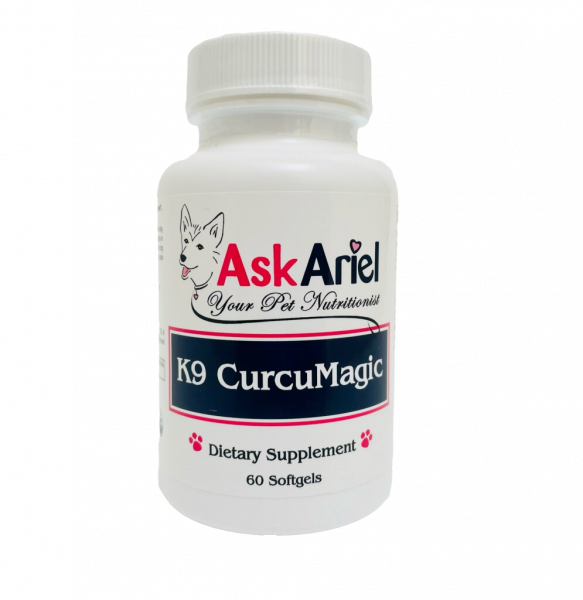 K9 CurcuMagic is a scientifically proven, natural anti-inflammatory pet supplement containing a patented combination of three curcuminoids acting as free-radical scavengers. These cancer-fighting nutrients in this unique bioactive turmeric formula help pets prevent and fight cancer. K9 CurcuMagic absorbs best when digested with fat, especially omega-3 fatty acids (found in Amazing Omegas), which is why our clients use the two pet cancer supplements together. If your pet is undergoing radiation, curcumin can protect the skin. K9 CurcuMagic is a scientifically proven, natural anti-inflammatory pet supplement containing a patented combination of three curcuminoids acting as free-radical scavengers. These cancer-fighting nutrients in this unique bioactive turmeric formula help pets prevent and fight cancer. K9 CurcuMagic absorbs best when digested with fat, especially omega-3 fatty acids (found in Amazing Omegas), which is why our clients use the two pet cancer supplements together. If your pet is undergoing radiation, curcumin can protect the skin.
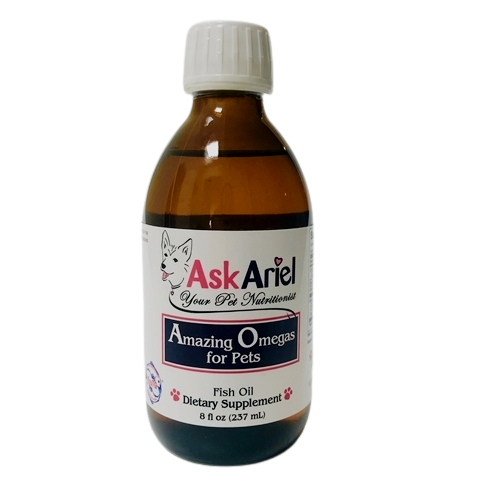 Amazing Omegas for Pets is the highest-quality purified fish oil available for pets. It is a powerhouse of omega-3 nutrients (essential fatty acids) that can help your dog fight cancer. Amazing Omegas is a highly purified fish oil made from sardines, anchovies and mackerel, processed with minimal heat to preserve the oil in its natural state. It’s packed in glass bottles to prevent any chemicals from plastic leaching into the oil. It’s naturally processed and highly bioavailable, and all toxins and heavy metals have been carefully removed. Compare the nutrient panel of this premium pet fish oil to all other brands and see the difference. Amazing Omegas for Pets is the highest-quality purified fish oil available for pets. It is a powerhouse of omega-3 nutrients (essential fatty acids) that can help your dog fight cancer. Amazing Omegas is a highly purified fish oil made from sardines, anchovies and mackerel, processed with minimal heat to preserve the oil in its natural state. It’s packed in glass bottles to prevent any chemicals from plastic leaching into the oil. It’s naturally processed and highly bioavailable, and all toxins and heavy metals have been carefully removed. Compare the nutrient panel of this premium pet fish oil to all other brands and see the difference.
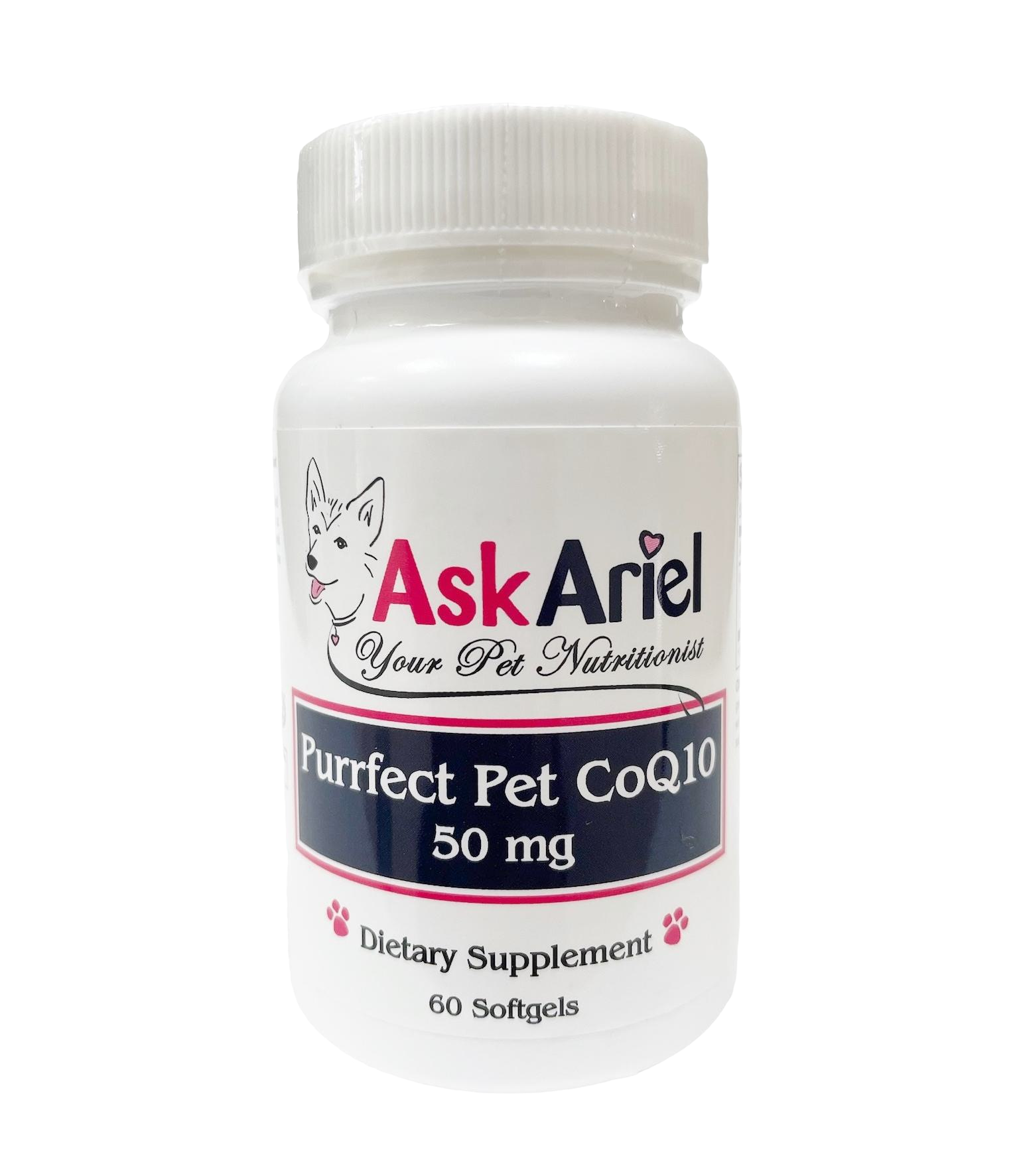 Purrfect Pet CoQ10 helps support your dog's circulation, cardiovascular and heart health on a cellular level. Mammary tumors often spread to the lungs, so strengthening and protecting the lungs is important. Coenzyme Q10 is a powerful antioxidant found in all cells that helps to facilitate enzyme activity and energy production and helps to maintain healthy heart function and respiration. Purrfect Pet CoQ10 can increase tissue oxygenation and help to ease lung inflammation. Purrfect Pet is made with genuine Kaneka Ubiquinol™, the reduced, active antioxidant form of coenzyme Q10. Ubiquinol is up to 8 times more absorbable than conventional coenzyme Q10 making the efficacy superior to other products with standard CoQ10 - backed by over 18 clinical studies. Purrfect Pet CoQ10 helps support your dog's circulation, cardiovascular and heart health on a cellular level. Mammary tumors often spread to the lungs, so strengthening and protecting the lungs is important. Coenzyme Q10 is a powerful antioxidant found in all cells that helps to facilitate enzyme activity and energy production and helps to maintain healthy heart function and respiration. Purrfect Pet CoQ10 can increase tissue oxygenation and help to ease lung inflammation. Purrfect Pet is made with genuine Kaneka Ubiquinol™, the reduced, active antioxidant form of coenzyme Q10. Ubiquinol is up to 8 times more absorbable than conventional coenzyme Q10 making the efficacy superior to other products with standard CoQ10 - backed by over 18 clinical studies.
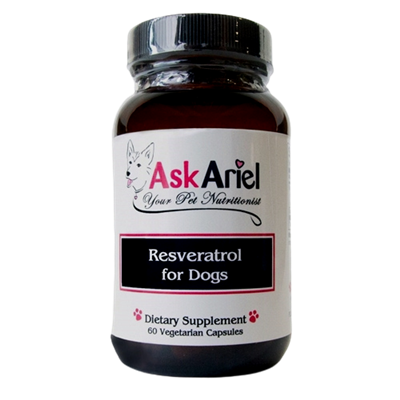 Resveratrol for Dogs is an exceptional antioxidant, backed by research, and can help your dog in so many ways. Cancer support and prevention (use with dog breeds that have a higher incidence of cancer, such as bichon frises, German shepherds, Labradors, golden retrievers and boxers). Resveratrol for Dogs acts on the process of carcinogenesis by affecting all three phases — tumor initiation, promotion and progression — and suppresses the final steps of carcinogenesis. Resveratrol for Dogs also supports immune function and provides excellent natural cancer support for dogs. Resveratrol for Dogs is an exceptional antioxidant, backed by research, and can help your dog in so many ways. Cancer support and prevention (use with dog breeds that have a higher incidence of cancer, such as bichon frises, German shepherds, Labradors, golden retrievers and boxers). Resveratrol for Dogs acts on the process of carcinogenesis by affecting all three phases — tumor initiation, promotion and progression — and suppresses the final steps of carcinogenesis. Resveratrol for Dogs also supports immune function and provides excellent natural cancer support for dogs.
|